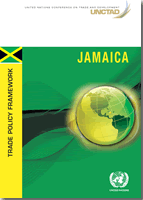
The ongoing review of Jamaica’s trade policy is motivated by the Government’s assessment that the country’ trade has underperformed over the last 20 years.
This underperformance is characterized by limited export growth and increased imports, as well as continued dependence on a few export products that have lost competitiveness in recent times and developed country markets that have been greatly affected by the financial crisis.
This has translated into insufficient development gains from trade, in terms of increased wealth and employment generation.
By reviewing its trade policy, Jamaica seeks to improve its trade and export performance and mainstream trade in its development strategy.
This Trade Policy Framework was prepared at the request of Ministry of Foreign Affairs and Foreign Trade of Jamaica. It provides a review of the country’s overall national development objectives and recent economic trends, an analysis of linkages between existing strategies and plans in different spheres of policymaking and trade policy in both the goods and services sectors, and recommendations for integrated strategic approaches to achieving the country’s key vision and objectives for its trade policy.
Main findings:
Jamaica has a high revealed comparative advantage (RCA) in some of the priority export sectors, including agriculture, agro-processing and beverages.
The tariff regime and import taxes remain the most commonly used policy to administer trade, and there seems to be over-reliance on tariff suspension as a trade policy tool.
The regional platform has not been leveraged sufficiently to promote complementarities in terms of infrastructure projects and coordinated trade strategies.
Compliance with quality standards and other non-tariff measures, particularly with respect to food and agroprocessed products, remains a major barrier to achieve diversification and export objectives in global as well as in regional markets.
Limited use of preferential tariffs in main products and main markets of export interest, except in the case of the European Union.
Abundance of trade and investment-related incentives (in both goods and services) and perceived limited development benefits derived from them.
In the area of services there was a multiplicity of policy objectives and no comprehensive vision or strategic plan for the sector that would reflect the importance of services as economic activities in the own right but also as key inputs into other sectors. To address this problem, a new services sector strategy and expansion plan was completed.
The report is organized as follows:
Chapter I outlines Jamaica’s national development goals and provides a review of the economic and trade performance of the country.
Chapter II looks at the trade policy environments related to merchandise trade and to services trade.
Chapter III includes recommendations on the trade policy framework.



